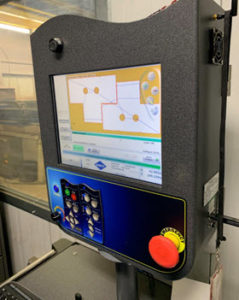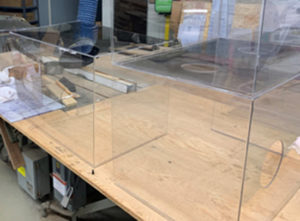At the start of the coronavirus pandemic when PPE was scarce — particularly for health care workers — a woman pregnant and with two small children at home, anxiously surfed the internet to find something that would protect her husband. Her husband, Joe Kiesznowski, is a certified registered nurse anesthetist at Detroit Receiving Hospital and at high risk of contracting the virus simply by the nature of his work.
Joe, along with the ER physicians are responsible for intubating patients, a process in which a tube is inserted, called an endotracheal tube (ET), through the mouth and then into the airway. This is done so that a patient can be placed on a ventilator to assist with breathing during anesthesia, sedation, or severe illness.
“That is a really risky time for us,” Kiesznowski said. “The intubation process can cause the coronavirus to become aerosolized and stay in the room. Patients are coughing and we’re trading tubes between patients. So not having appropriate PPE can be life-threatening.”
Kiesznowski’s wife found a design online by a Taiwanese doctor for an intubation box that would act as a barrier and keep the aerosolized droplets inside the box instead of allowing them to become airborne.
“We immediately set out to find someone who could make them for us, Kiesznowski said. “That’s when my wife’s brother, Joe Musallam stepped in.”
Joe Musallam is the director for Tree Trim in Distribution Operations at DTE and offered to bring the idea to DTE to see if the company could make them.
“I was sure we could do it faster and cheaper, so I sent the design to Andre Boatner, manager, Shelby Service Center, who took it to the company’s Warren Service Center (WSC) Shops.
“Andre showed us a picture, and asked if we could help,” said Darryl Werner, WSC sheet metal leader. “Our carpenter lead Jake Kamakaris and I put our heads together and tried a couple ideas before we came up with a design that worked. We had an assembly system going. My shop would take the clear plastic sheet, cut it with our water jet system, then grab it and bend it into our press break, then deliver it to the carpenter shop where they would complete the final assembly.”
“We made some modifications to the original design that included: using a lighter 1/8” polycarbonate instead of ¼” to make it lighter; made sure there were no visible screws or rivets, because they wanted them to be very easy to clean; and made the holes larger to more easily fit over patient’s heads,” Kamakaris said. “Once we got final approval from our customer, it got so we could make 40-50 a day.”
After Detroit Receiving Hospital received their first boxes, Kienznowski posted to the Michigan Association of Nurse Anesthetists Facebook page, letting them know that DTE could make the boxes and would provide them for free, the requests came pouring in to Terrell Lockhart, manager, Distribution Operations Support.
“I coordinated the distribution of the boxes to the nurses,” Lockhart said. “After Kiesznowski let his medical contacts know the boxes were available, my phone blew up, so I had to get a special email address just to handle all of the requests. And I want to give a special shout out to Garry Tolar, general supervisor of Vegetation Management in Distribution Operations, for making all of the deliveries for us.”
Thus far, the WSC Shops have supplied more than 150 intubation boxes to hospitals across DTE’s service territory. Now with everyone back to work, the job will continue with a third-party manufacturer backed by the DTE Foundation.
“I am incredibly proud of our WSC Shop’s work on this project and the overall collaboration between the two business units within DTE, and that we were able to help in this way,” said Justin Morren, director Fossil Generation. “DTE cares about the communities where we live and serve, and this is a great example of what can be accomplished when we work together.”
“It was a concerted effort between us and Distribution Operations,” Werner said. “We each in our way did what we could to help. Health care workers are way more exposed to the virus than we are, so to give them some type of help felt really good.”

